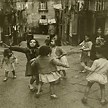
The Neighborhood
Can you believe it? The maple leaves are starting to turn. It seems like summer, while we’re still in the middle of August, has already started to pack up and go. Not happy about that, of course, but if summer’s got to go, could it please take the temperature with it? After several weeks of lovely Maine-like weather, the mercury has shot back up into the humid nineties just in time, that’s right, for teachers and students to pour back into all those un-air-conditioned schools.
There are many things I mourn about the end of the summer vacation, one of the main ones being the termination of my extended summer reading gorge. I’ve lost count how many books I’ve devoured since the end of June, but I’m going to rave to you about only three, a trilogy, by the Italian writer Elena Ferrante.
On the face of it, the story of the entire trilogy is very simple. The books follow the friendship of two Italian women, Lila and Lenú, from childhood through to adulthood. Lila and Lenú grow up in a poor, working class neighborhood of Naples in the 1950’s where everyone speaks dialect, most children don’t advance beyond elementary school, and life is brutish, violent and sometimes all too short. The first novel in the trilogy is called My Brilliant Friend, a title which would work equally well for all three books, for the main theme running throughout the trilogy is the superiority of the one friend, the superiority of her intellect, her spirit, and her thirst for life, over the other.
The novel begins with the two girls in the same neighborhood elementary school class where Lila always comes first in the class competitions and Lenú second. When elementary school ends; however, Lila’s parents refuse to allow her to continue. School books in Italy in the 1950’s have to be paid for out of parents’ pockets and the family simply can’t afford it. Lenú, whose parents also can’t afford it, has a champion, however, in the local elementary school teacher who goes to Lenú’s parents and insists Lenú be sent on to the middle school. Lenú’s mother and father are skeptical, but the teacher offers to get second-hand books for Lenú to use. Her parents are both flattered and offended at this special attention, but eventually grudgingly agree.
And so begins the divergence of experience between the two girls. Lila stays in the neighborhood and works in her father’s shoe repair store, Lenú goes on to middle school, excels, continues on to high school, excels there also, and eventually leaves the neighborhood and Naples to study at a university in Pisa on a full scholarship. Upon completing her degree with distinction, Lenú publishes a novel and marries the son of a famous Italian politician. They go to live in Florence where her husband has gotten a much sought-after university position.
Meanwhile, Lila has stayed in the neighborhood and at the age of sixteen married a local grocer. He beats her. She bears him a child, but then leaves him for a university student who walks out on her after 23 days. Lila goes back to the grocer only to leave him again and ends up living monogamously with another man from the neighborhood, a railroad engineer. She gets a job, a miserable, degrading, physically-punishing job in a sausage factory.
If you were asked to guess which of these girls was the “brilliant” one, you could be forgiven for picking Lenú, the one who gets out, who continues her education, who publishes books, but you would be wrong. The brilliant one, the one with the superior intellect, will, and thirst for life is Lila, the one who stays.
The narrator of the books, Lenú, is painfully aware of the superiority of her friend. She’s been aware of it since childhood. Lila is smarter, more creative, more sure of herself and in her limiting surroundings often finds astonishing ways in which to express her genius. Every time Lenú returns to the neighborhood hoping in some small way to bask in the sunlight of her achievements, she comes up against some new, unexpected proof of Lila’s talent for life.
The way in which their relationship plays out over the years is the fascination of the books. Ferrante’s exploration of the psyche of both women is intense.
Beyond this, however, there is the great thing about all great literature. You can read a story set in a country you’ve never been to in a time before you were born and what is described in this story resonates so completely with you because in fact it is about you or something you know well. In this case, I am speaking of phenomenon of the neighborhood.
For the trilogy could equally well be titled, You Can Take the Girl Out of the Neighborhood, but you Can’t Take the Neighborhood out of the Girl. Because the books are not just about the brilliance of Lila, but also the deeply ingrained sense of inferiority of Lenú.
For even as Lenú succeeds in each new school and moves on to the next, even after she continues to come out on top in every exam, Lenú remains convinced of her inferiority, not only to Lila, this is a given, but to all the students who don’t come from her neighborhood or a neighborhood like it. Most of the students she competes against didn’t need to learn Italian in school, they spoke it already at home. They didn’t need to study every fact. They’d heard about things in conversation, from their parents, their families, their friends. There were books on the shelves of their homes, paintings on the walls. They went to concerts and plays. They took vacations in foreign countries. They were confident of their place in the world, confident of their birthright.
I look around the neighborhood where I teach, an inner-city American neighborhood, and almost everything Ferrante writes about her down-trodden Neapolitan neighborhood of the 1950’s could be written of this struggling American one in 2015. There is the same lack of economic opportunity, the same threat of violence, the same pressure to be cool, tough, and hard rather than successful in school. But most of all there is the same doubt, Lenú’s doubt. I see this doubt in the eyes of our children, even our most gifted ones. I see this doubt in the eyes of our parents. Are their children good enough? Can they really make it out?
And the answer is they can, but that it’s brutally hard. You have to work harder. You have to be iron-willed. You have to have a discipline and a commitment beyond your years. It helps if someone helps you, some person who doesn’t necessarily have to. A teacher perhaps, a minister, a friend. But even after all this, there’s no guarantee.
If you do come out, you come out with scars, with baggage.
Lenú came out carrying the burden of her doubt, a burden that despite her rise she never put down. It is in fact Lila who has believed in Lenú all along even when Lenú didn’t believe in herself, Lenú’s childhood friend Lila, who tells Lenú again and again that she is the brilliant one, the one who has succeeded, the one who’s made it out for both of them.
I highly recommend:
Elena Ferrante’s Neapolitan Trilogy:
My Brilliant Friend
The Story of a New Name
Those Who Leave and Those Who Stay
And coming on Sept. 1st, book number four!





There are so many obstacles that one encounters, when the odds are stacked against you. Self doubt is the biggest hurdle of all. To have self belief draws from every fiber of one’s being. The lucky ones use their baggage and scars, to build a constructive , positive , strength that is unsurpassed. How do we teach that ? I think we start with self awareness and worth, that would be the first step. Hopefully, self belief will follow.
Thanks for sharing the triology, as it seems to be a worthy read.
It’s terrific and highly addictive.
Linda – I’m intrigued, I’ll have to look for these.
Thanks for this review! I’m also intrigued. And—no air conditioning??
Linda,
I love your post and I couldn’t have described the books better myself. It sounds like you enjoyed them as much as I did and to anyone out there looking for something to read I say start with a copy of My Brilliant Friend, stock up on provisions, and plan on spending some time in a comfy spot in your home. You won’t want to put this book down.
Linda,
You couldn’t have covered a more worthy topic, better. Brava! One of the things that the series does so well is illustrate how social and cultural norms impact the notion of identity both for self and society, and to relentlessly question their legitimacy. I am really curious as to whether Elena Ferrante will explore the concept of liberty the same way in book four.